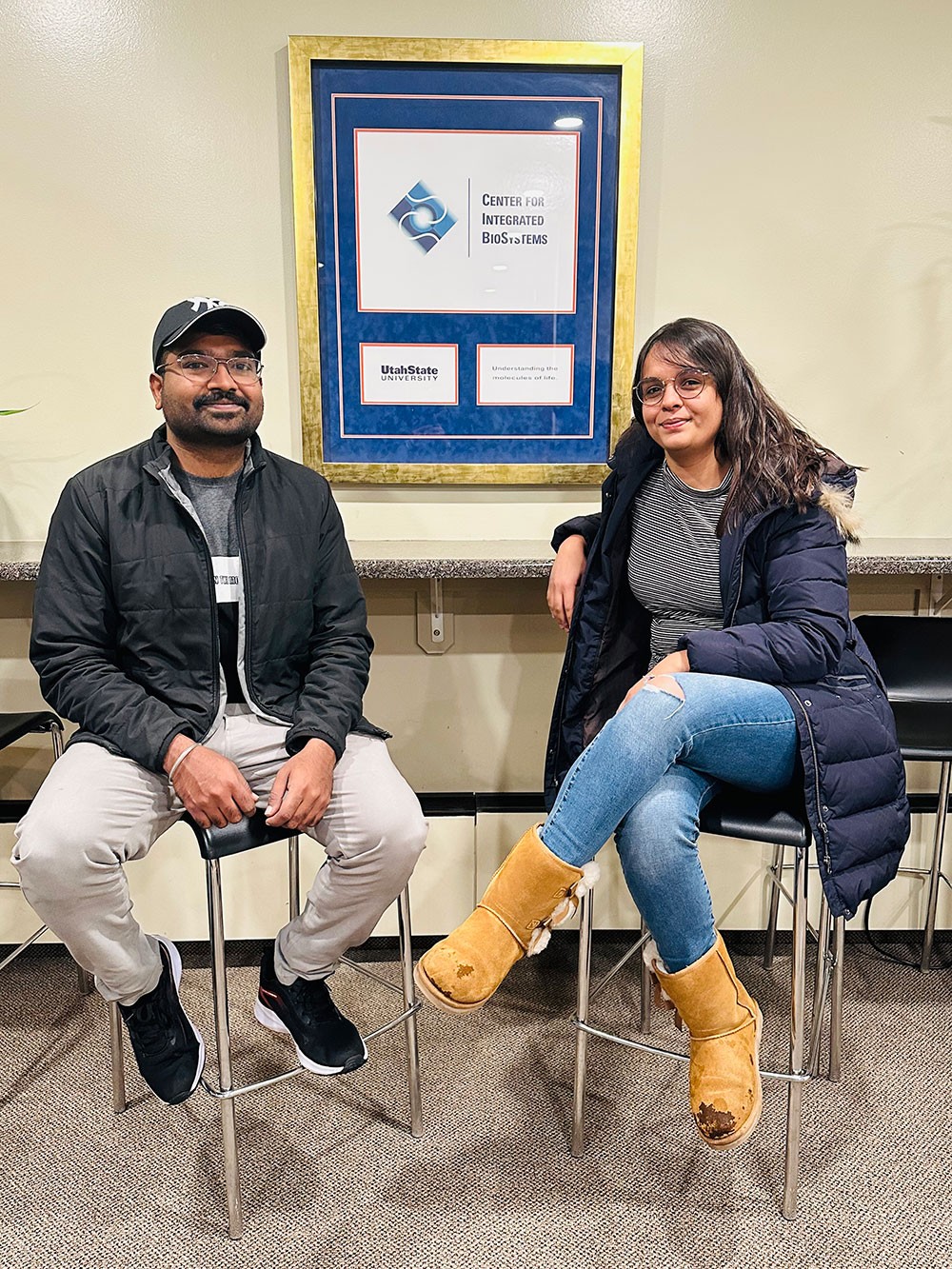Fulbright, NAHEP Doctoral Students Bring Big Data and Ideas to USU Bioinformatics Lab
By Ethan Brightbill |
The Utah State University Bioinformatics Facility recently hosted two graduate students funded by prestigious scholarships. Simardeep Kaur came to USU on a Fulbright-Nehru Doctoral Fellowship, while Tamil Selvan received funding from the Indian Council of Agricultural Research through the National Agricultural Higher Education Project (NAHEP).
Selvan and Kaur are also the first students hosted by USU’s Bioinformatics or the Plants, Soils and Climate Department to come from the Indian Agricultural Research Institute (IARI), which spearheaded the rapid expansion of India’s agricultural production during the Green Revolution in the late 1960s and ’70s. Rakesh Kaundal, associate professor and director of both the USU Bioinformatics Facility and the Kaundal Artificial Intelligence and Advanced Bioinformatics Lab (KAABiL), was glad to welcome them to USU.
“I’m very proud to have initiated this collaborative venture,” Kaundal said. “The success of Simardeep and Tamil’s visit has certainly opened new avenues of collaboration in other areas of agriculture.”
Kaundal explained that while the IARI has the expertise to generate extensive data from its field and lab experiments, the institute lacks the computational resources needed to study the millions or even billions of ways an organism’s genes can interact with each other. However, that sort of big data analysis is KAABiL’s specialty, and Selvan and Kaur came prepared to share their research and learn how to do some of that analysis themselves.
The result of that collaboration has been two papers published in reputed international journals, four more that are under review at other journals, and yet another four that will be submitted soon. Work is also under way to establish a memorandum of understanding between IARI and USU that will open additional opportunities for collaboration.
Most important of all, however, is the research itself. Kaur and Selvan are looking to identify how gene interactions in rice affect traits like drought tolerance or the ability to grow in the absence of phosphorus and other nutrients. That knowledge can in turn be used to create new crop varieties that can thrive and provide food even as global temperatures rise and weather patterns become increasingly unstable.
Selvan and Kaur were each in the process of earning their doctorates at the IARI when they came to USU, so their time at the bioinformatics lab was limited: three months for Selvan and nine for Kaur before a job offer to work for India’s Ministry of Agriculture as a scientist cut her stay short. Even so, both spoke highly of their experiences at USU.
“Compared to my country, there are a lot of opportunities here,” Selvan said. “I’m planning to do my postdoc in bioinformatics, so maybe after a couple years, I’ll come back here for that.”
While Kaur’s new position made a return in the near future unlikely, she also didn’t rule it out.
“My relationship with the USA is very special,” Kaur said. “When I was a little girl, I saw New York and California in movies and web series, and I knew it was the first country I wanted to visit. Many of my relatives are in Canada, and they asked me to go there, but I said ‘No, Canada is Canada. USA is USA.’ So this Fulbright scholarship was not just a professional thing, but also one of my dreams. I’m leaving with a heart filled with memories in just seven months, and this country has been so supportive, and I’m very grateful. I may have to come back.”
For Selvan, studying the mechanisms that make plants work is an opportunity to help India grow and thrive.
“Agriculture is the backbone of our country’s economy, so I chose my career in agricultural biochemistry,” he said. “It’s very interesting to work on the basics of plants, and it’s a small contribution to my country’s success.”
Kaur also sees her work in a greater context.
“For all of us, the goal of being an agriculturist is to have sustainable food security and nutrition in the future,” Kaur said. “We need to leave this planet safe for the next generation. In the end, whether you’re a plant biochemist, an agriculturalist like me, or a bioinformatics expert, the end goal is the same.”
Tamil Selvan and Simardeep Kaur pose for a picture at the Center for Integrated Biosystems at USU.
WRITER
Ethan Brightbill
Writer and Marketing Assistant
College of Veterinary Medicine
Ethan.Brightbill@usu.edu
CONTACT
Rakesh Kaundal
Associate Professor and Director
Department of Plants, Soils and Climate/USU Bioinformatics Facility
rkaundal@usu.edu
TOPICS
Biology 165stories STEM 163stories Genetics 63storiesComments and questions regarding this article may be directed to the contact person listed on this page.









